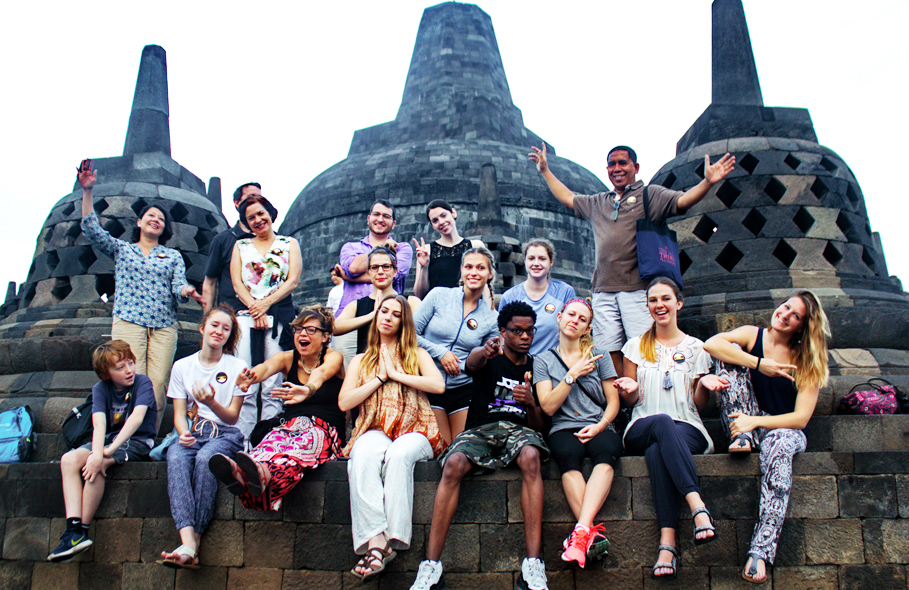Worldly Education: Learning to Teach in a Global Context
by Tom Hanlon / Jan 26, 2021

The power of teacher education is amplified when it is learned in a global context. Through International Programs at the University of Illinois, pre-service teachers gain teacher training and experience abroad so they can teach students how to function in a global context—which is a huge advantage for students today.
When Allison Witt first came on board in 2015 as director of the Office of International Programs for the College of Education, she thought her main duties would be taking care of the international students who were coming to the College to study.
After all, most of the domestic students were preparing to become teachers in Illinois. What good would studying abroad do them? Students from engineering and business and other schools went abroad—not pre-service teachers.
Mary Kalantzis, dean of the College at the time, had other ideas. “Mary told me ‘you need to get every single student to study abroad,’” Witt says. “’We need to drastically change what it means to be in education. It needs to be a global profession.’”
Witt quickly became convinced that Kalantzis was right, even though studying abroad was far from standard practice for pre-service teachers at the time, either at the University of Illinois or elsewhere. The College was sending about 20 students abroad when Witt took over the program; now they are sending upwards of 150.
“What happened was, the world changed,” Witt says. “It became more global, and the people in education realized it.”
The Power of International Education
Witt is passionate about the need for global studies. “While the US leads the world in higher education, we’re not there at K-12,” she says. “There are places that are lot higher ranked than the US, and our teachers need to go and learn from those teachers, and then come back and adapt what they learned to a US context. We need to expose our students to the best cutting-edge practices in education worldwide.”
And Witt truly means worldwide. “There’s essentially no place we won’t go,” she says. “There are good teachers everywhere.” Through the program, students have traveled to Morocco, Spain, France, Costa Rica, Italy, Indonesia, Greece, Ireland, Singapore, Tanzania, Namibia, and England. All placements are done with the idea of exposing the student to new ideas, practices, and cultures that will expand their abilities to teach once they return to Illinois.
“We have more destinations than anyone else, from what we can tell,” Witt says. “Part of that is because of the strength of our alumni. We have alumni all over the world, and that allows us to quickly form partnerships. When you have teachers in the schools or running the schools or running the ministry of education, it makes it a lot easier to establish partnerships.”
Witt sees a larger reason for international education, one beyond preparing students to teach in a global context. “For our very survival, we’re going to have to learn to work together,” she says. “Our planet has been screaming this at us for a while, and we kept ignoring it. This is the next way we are being told you have to play nice together, you have to collaborate. We’re not going to survive as a species if we’re not going to talk together, learn together, and work together.”
One of the great lessons of international education, Witt says, is embracing differences. “We begin to see difference as normal, and, in fact, exciting and interesting and important, rather than scary and threatening,” she says. “That’s really the promise of International Programs.”
The Scope of International Programs
International Programs, of course, is not just about sending domestic students abroad. It’s about hosting international students who come to the College to learn from faculty who are undertaking groundbreaking research. The College is home to students from nearly 40 countries around the world, and hosts visiting scholars, weekly Global Cafés, and an annual Global Education Symposium.
The number of international students is greater at the graduate level, but that is shifting, Witt says. “So much of what we do at the undergraduate level is training teachers for Illinois licensure programs, so those programs are not as attractive on a global scale,” she explains. “But we recently added the Learning Education Studies degree, and that is attracting more international students.”
The Secret to the Program’s Study Abroad Success
Study abroad for students in the College of Education is not the typical study abroad experience. “We take our teacher training model and put it in a global context,” Witt says. “Our students don’t just study abroad; they do teacher training abroad, and that’s different.”
The College is trying to deeply embed the study abroad experience into its pre-service curriculum. “And that’s unique,” Witt says. “A lot of campuses offer study abroad, but it’s not built to be specific to education the way ours is. That’s the secret to our success, to follow the practices that are part of teacher education.”
In the study abroad program, practicing teachers often accompany pre-service teachers, “because that’s how our students learn to become teachers,” Witt says. “They go to classrooms and they observe and talk to the teachers there, and learn to become teachers. We’ve taken that model and moved it out from the local community to the global community.”
Witt sees International Programs as serving a mission that extends beyond the College’s mission. “This is a very global campus, and we need to be a part of that,” she says. “In terms of our land grant mission to serve the local community, this is exactly how we should be doing that, because we need to train teachers who can then train the local community how to function in a global context.”